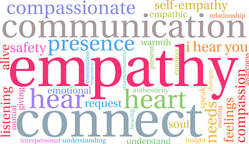 Dr. Nicole Monteiro. Are you aware of your emotions in different situations? Do you try to understand how others are feeling? Are you able to cope with the daily demands and stresses of life, such as frustration, irritation and anger? Are you able to use your emotions and how others respond to you to guide your decisions and help you assess a situation? These characteristics are all part of being emotionally intelligent. The concept of emotional intelligence (or EQ) was popularized by Daniel Goleman's book, Emotional Intelligence, and has gained more awareness and attention in the scientific community over the past 20 plus years. Researchers have noted it is important for coping with stress, performing well academically, making moral and ethical decisions, becoming a good leader, and having fulfilling friendships and relationships. There are many theories for why awareness of your own and others' feelings is an important tool for navigating much of life, especially the parts that require us to communicate and deal with conflict. Emotional intelligence connects the way we think, what we feel and how we perceive other people and the world around us. Sometimes defined as interrelated abilities to "monitor one's own and others feelings and emotions, discriminate among them and use this information to guide one's thinking and actions." It's about how you first perceive (or notice), appraise (or make sense of), express (or communicate), and regulate (or manage) your emotions. More important, it's about how we experience and express empathy and understanding in our interpersonal relationships. So, basically, emotional intelligence plays a part in the entire gamut of what we do on a day-to-day basis. I like to call it managing the emotional labor of everyday life. My colleague, Dr. Shyngle Balogun, and I conducted an interesting psychological study, where we investigated how one's emotional intelligence abilities affected communication and conflict styles within relationships. Specifically, we had male and female participants watch two movie clips, one depicting an argument (non-violent conflict) between a couple and the second depicting a verbally and physically violent conflict between a couple. After the watching the clips, the participants answered a series of questionnaires, including questions about how they would handle each of the two conflict situations and questions that measured emotional intelligence. Our goal was to look at conflict and communications styles in romantic relationships and how a person's level of emotional intelligence affects how people dealt with conflict in their relationships. The different conflict styles we explored were:
What did our study find? Not surprisingly, higher levels of emotional intelligence were related to the more "advanced" or "healthier" approaches to dealing with relationship conflict - specifically, compromise, accommodation and the healthiest method, collaboration. These conflict resolution approaches tend to be healthier because they get couples out of the fight, flight or freeze cycle that some couples engage in that leads to stonewalling, holding grudges and being overly critical of each other. We also observed some interesting gender differences: Women were more likely to report collaboration in response to the non-violent conflict situation and men were more likely to report accommodation in response to the violent conflict situation. What does all of this mean? Well, conflict in a normal part of relationships and that means the longevity and quality of a relationship is determined in part by how each partner learns to navigate their difficult conflicts and disagreements. What our study highlights is that emotional intelligence could be one of the keys to unlocking healthier ways of communicating and dealing with relationship conflict. How aware you are of your own and others' emotions says a lot about how well you'll be able to fight fairly, disagree without destroying and care as much about your partner's emotional needs as your own. Your emotional intelligence - your awareness of your own and your partner's emotions, being able to acknowledge your own and your partner's difficult emotions, and feeling capable of managing and regulating your emotions - helps you to deal with conflict in your relationship in healthier ways, which can lead to greater relationship satisfaction. So for the sake of your relationship, it may very well be time to getting smarter and work on your EQ. You can read the entire research study here
1 Comment
 Dr. Nicole Monteiro As a psychologist, educator and mentor, I have found over the years that empathy is one of the most underrated - but potent - therapeutic interventions used in helping professions. It is one of the most powerful antidotes to the helplessness, hopelessness and despair that the people we are charged with helping bring to our offices and healing spaces. In this age of evidence-based therapy approaches, it can seem anachronistic to focus on the relationship between therapist and client as one of - or perhaps the - most important factors that contributes to healing. I have often observed that many beginning therapists find it hard to accept that their empathy and complete presence are as important as any advanced counseling technique that they learned in school. Science backs this up. There is an extensive and growing body of research on the function of mirror neurons, the biology of attachment, and the connection between emotions and cognitions, which points to the essential value of relating to another human being genuinely, authentically and empathically. We all have the human need to RELATE and to be RELATED TO. Demonstrating empathy is a skill that many therapists have honed through their education and training. But empathy is a basic part of caring relationships that all of us have the capacity to give and receive. Recognizing and practicing everyday empathy is a simple way to deepen our connection to others, ourselves and our higher purpose. Empathy is what makes others more human to us and even makes us more human to ourselves. When you try to see yourself in your family, friends, neighbors, co-workers, passing stranger or other random encounters you help to counter some of the more dangerous human instincts, such as aggression, violence and self-destruction. These negative instincts are often triggered by the need to protect ourselves from others we perceive as dangerous because they are foreign, unlike us or outside of our tribe or group. The problem is these perceptions are often inaccurate and stem from cognitive biases and other psychological distortions. Empathy is one step toward being able to blur the line between us and them and envision our common experiences and fate. Everyday empathy can be practiced and refined in multiple ways. This short list includes small steps we can all take to develop greater empathy for others and compassion for ourselves.
Let me know how you've experienced and practiced empathy in your everyday life. ~Dr. Monteiro |
Nicole M. Monteiro, Ph.D.Clinical Psychologist Archives
January 2018
Categories
All
|

 RSS Feed
RSS Feed